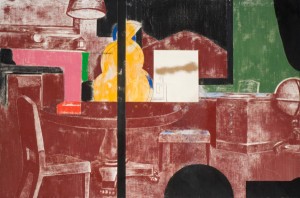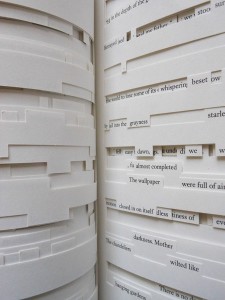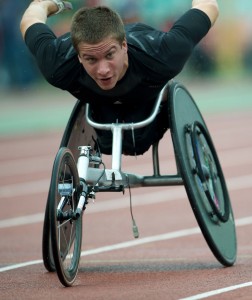I am impressed above all with R.B. Kitaj’s collage-like works, produced by superimposing numerous pieces of information and artistic citations. With their powerful colors, they radiate at first a kind of lightness and beauty.

R.B. Kitaj, Desk Murder 1970–1984 © Birmingham, Birmingham Museum and Art Gallery
The actual stories behind the motifs become clear only when one reads the texts that Kitaj attached to his pictures. These additional levels turn the collages into fraught projection screens for personal, historical, political, cultural, and religious themes and events. Suddenly text and image can no longer be viewed and understood separately. A putatively beautiful, gaily colored work becomes a vexating puzzle. → continue reading
Searching for a Jewish past is the topic of Jonathan Safran Foer’s Tree of Codes. His best-selling, Hollywood-adapted debut novel Everything is Illuminated (2002) already depicted a young man on a trip to the Ukraine in search of his family’s past.  His new book is also a search for Jewish roots, though this time artistic, rather than biographical.
His new book is also a search for Jewish roots, though this time artistic, rather than biographical.
Experimenting with the concept of absence, the book reproduces parts of Bruno Schulz’s Street of Crocodiles, the English translation of one of two surviving texts of a writer, whose other works were lost when the National Socialists seized his Polish hometown Drohobycz in 1941 and murdered its citizens, including Schulz, in 1942. As if to depict the loss of literature by destroying the letters in a book, Foer cut into Schulz’s pages, leaving only select words and half sentences behind, thereby reducing, already in its title, Street of Crocodiles to Tree of Codes. → continue reading
Just a few weeks ago in Stoke Mandeville, England, a large bronze statue was unveiled in honor of a Jewish physician from Breslau, who – despite his moving story, his pioneering efforts, and the international significance of his work in Germany – is virtually unknown here:

Marc Schuh, wheelchair racer (medium distance), member of the German team at the London Paralympics, 2012 © Behinderten-Sportverband Berlin e.V.
Ludwig Guttmann, the father of the Paralympic Games that were opened in London on 29 August. More than two and a half million spectators will cheer on the over 4,000 athletes there. Guttmann is well-known in Britain, where he was awarded the Order of the British Empire and where the BBC made a film about him entitled “The Best of Men.”
Ludwig Guttmann was born to an orthodox Jewish family in Tost, Upper Silesia in 1899. He grew up in Chorzów, where he worked at the hospital for the first time with paraplegics. Following his medical training in Breslau and Freiburg, he specialized in the young field of neurosurgery from 1924 and was soon considered one of its leading doctors. After Hitler’s rise to power in 1933, Guttmann was no longer permitted to practice in a public hospital. Despite several offers from America, he stayed in Germany and took up a specialist post at the Jewish Hospital in Breslau where he later became director. When he learned of the violent excesses during the November Pogrom in 1938, he instructed his staff to admit all refugees to the hospital without examination. In spite of a Gestapo investigation at the hospital, he was able to save 60 Jewish citizens from arrest and deportation to a concentration camp. → continue reading


